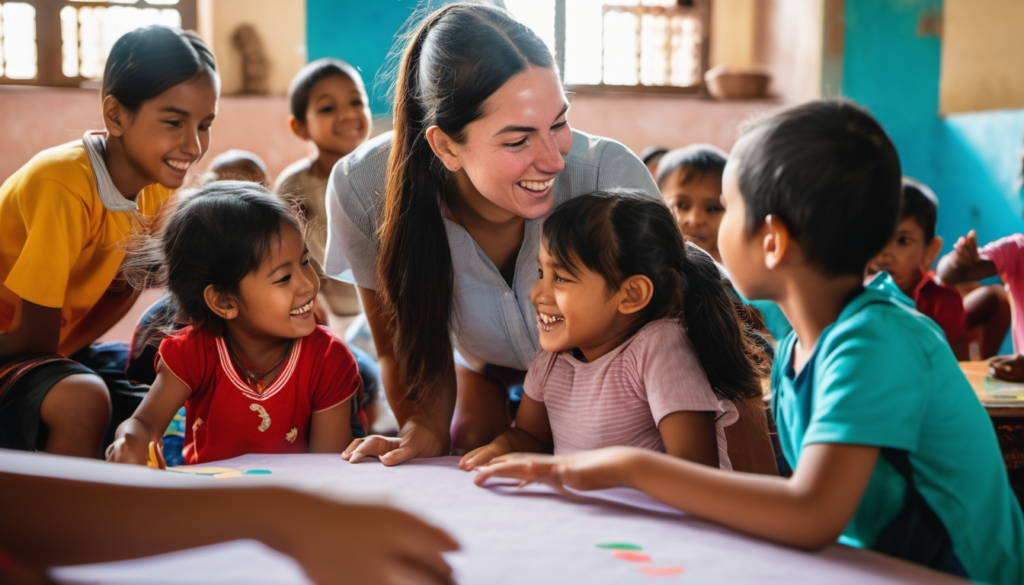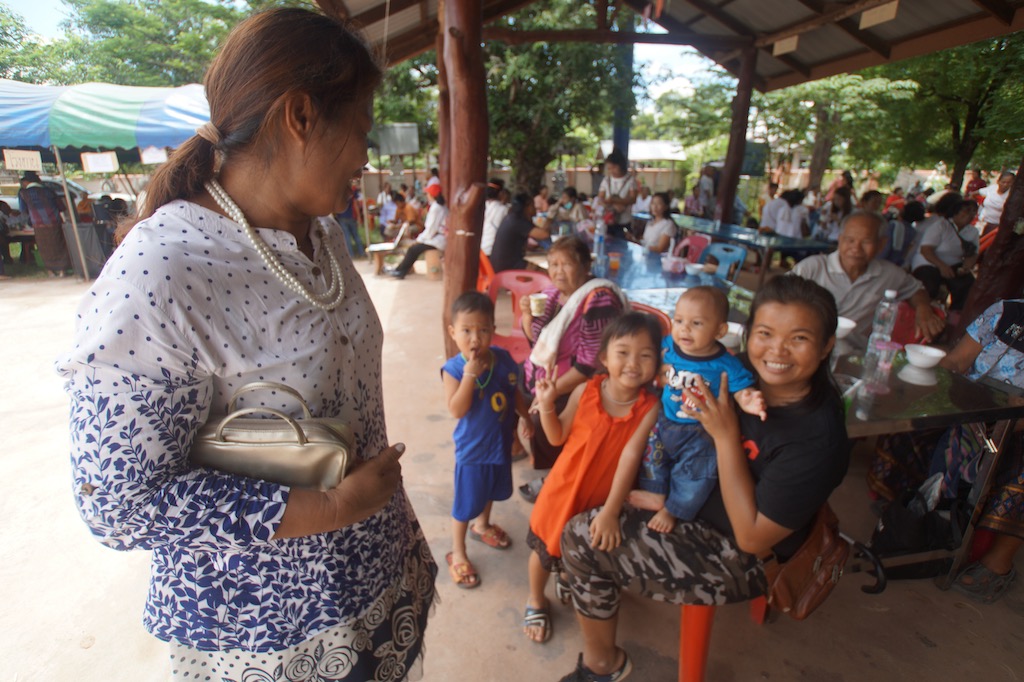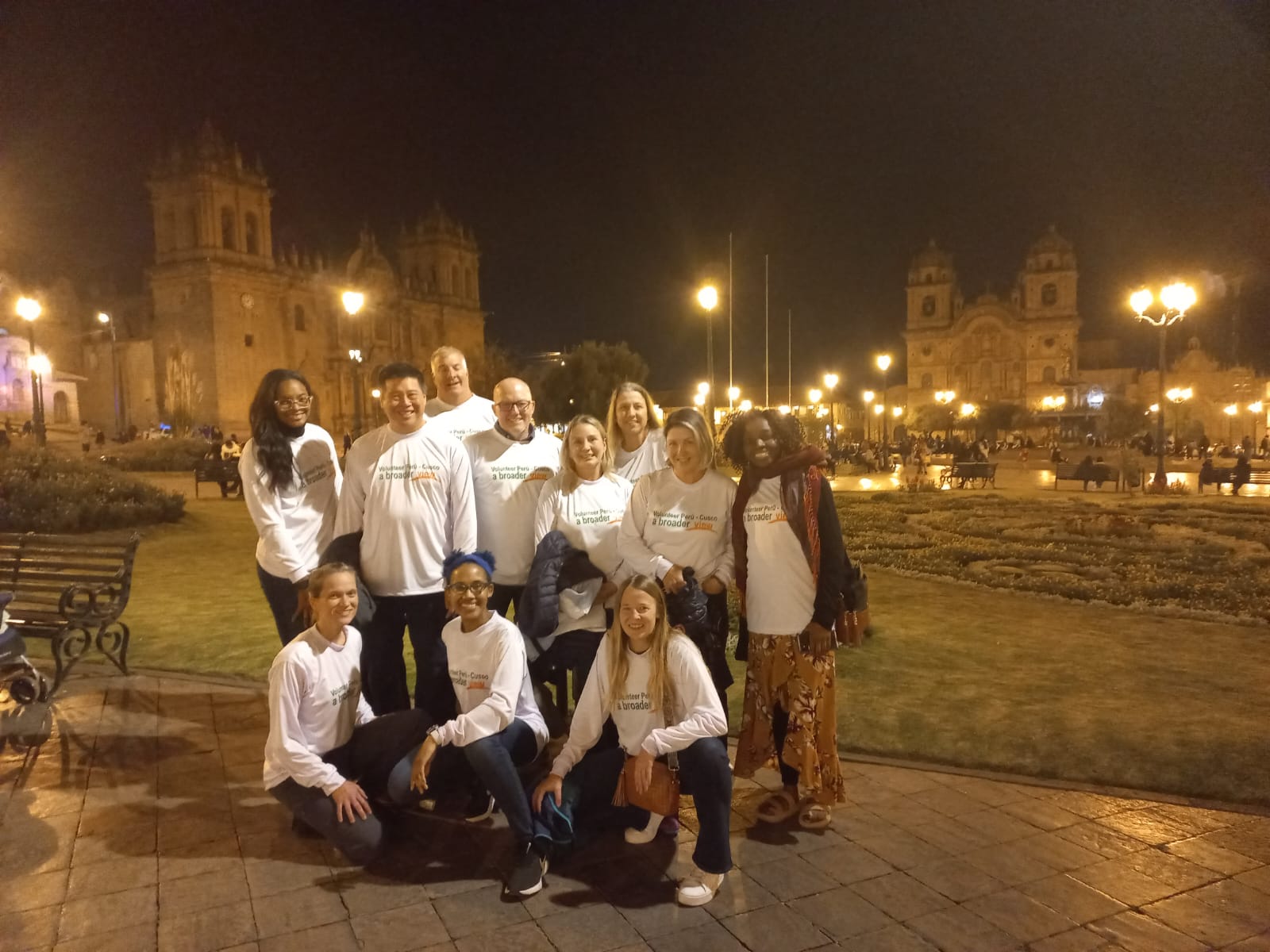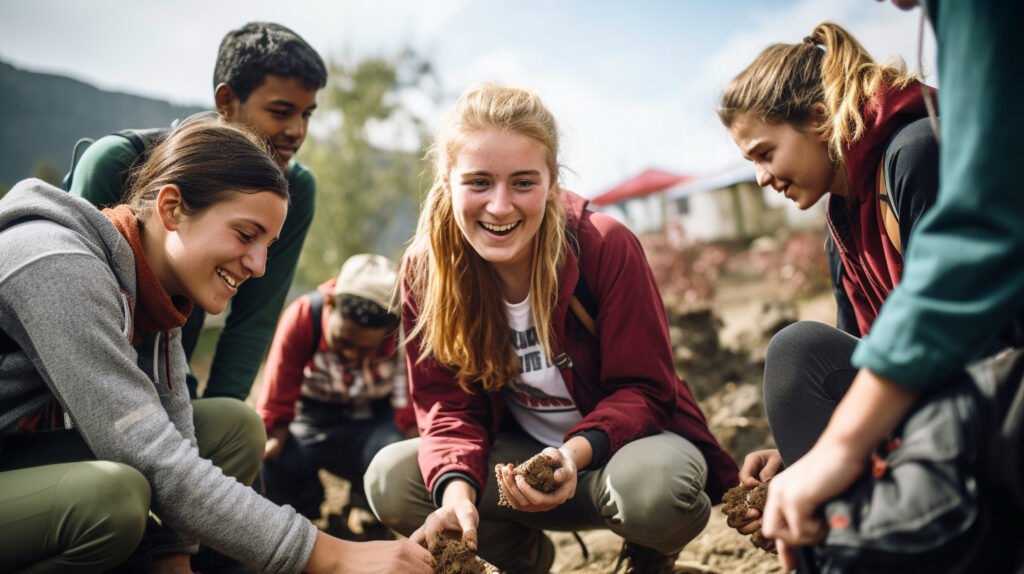Education is not just limited to the classroom. There are countless opportunities outside of traditional educational settings that can have a profound impact on a student’s personal growth and development. One such opportunity is volunteering abroad. Volunteering abroad allows students to engage in meaningful projects while immersing themselves in different cultures and communities. This unique experience can have a lasting impact on their education and future careers.
Volunteering abroad is not just about traveling to new places; it is about making a difference in the lives of others. By dedicating their time and skills to help those in need, students can develop a sense of purpose and empathy that is invaluable in today’s interconnected world. Whether it is building schools in underserved communities, teaching English to local children, or supporting conservation efforts, the impact of volunteering abroad goes far beyond the immediate tasks at hand.
In this article, we will explore the impact of volunteering abroad on students, how to choose the right program, and the preparation required for a successful experience. We will also discuss the benefits of volunteering abroad for education and future career prospects, as well as the challenges students may face and how to overcome them. Additionally, we will touch upon important ethical considerations to ensure that volunteering abroad is done in a responsible and respectful manner.
So if you’re a student looking to broaden your horizons and make a difference in the world, volunteering abroad might just be the perfect opportunity for you. Let’s delve deeper into the world of volunteering abroad and discover the transformative power it holds.

Understanding Volunteering Abroad
Defining volunteering abroad
Volunteering abroad refers to the experience of traveling to another country to participate in a voluntary program that aims to make a positive impact on the local community and environment. It involves dedicating your time, skills, and energy to help others and contribute to a meaningful cause. This can include activities such as teaching, healthcare assistance, environmental conservation, community development, and more.
Benefits for students
Engaging in volunteering abroad can have numerous benefits for students. Here are some key advantages:
- Global Perspective: Volunteering abroad allows students to gain a broader understanding of different cultures, traditions, and social issues. It provides an opportunity to step outside of one’s comfort zone and develop a global perspective.
- Personal Growth: Volunteering abroad offers tremendous opportunities for personal growth and self-discovery. It allows students to challenge themselves, overcome obstacles, and develop valuable life skills such as adaptability, resilience, and problem-solving.
- Professional Development: Volunteering abroad can enhance a student’s resume and make them stand out in a competitive job market. It demonstrates their commitment to social responsibility, cross-cultural communication skills, and ability to work in diverse teams.
- Networking: Volunteering abroad offers the chance to meet like-minded individuals from around the world. These connections can lead to long-lasting friendships and valuable professional networks.
- Enhanced Empathy: By working closely with local communities and understanding their challenges, students develop empathy and a sense of gratitude. These qualities are essential for building strong relationships and becoming compassionate global citizens.

Overall, volunteering abroad provides students with a unique and transformative experience that goes beyond the classroom. It allows them to make a positive impact in the world while gaining valuable skills and perspectives that will benefit them throughout their lives and careers.
“Volunteering abroad allows students to make a positive impact while gaining valuable skills and perspectives that will benefit them throughout their lives and careers.”
Choosing the Right Volunteering Program
When it comes to volunteering abroad as a student, choosing the right program is crucial. Not only will it shape your experience, but it will also determine the impact you can make and the skills you can develop. Here are a few key considerations to keep in mind when selecting a volunteering program:
Researching available programs
Before diving into any volunteering opportunity, it’s important to do thorough research. This will help you find programs that align with your interests and goals. Use online resources, read reviews, and reach out to past participants to get a better understanding of the organization and its work. Look for programs that have a positive reputation and a track record of making a meaningful impact.
Considering personal interests and skills
Think about the causes or issues that you are passionate about. Is it education, environmental conservation, healthcare, or community development? Choose a program that allows you to work in areas that resonate with you and that can leverage your skills and abilities. This will not only ensure a rewarding experience but also enable you to contribute effectively.
Assessing program credibility
When selecting a volunteering program, it’s crucial to assess its credibility. Look for organizations that have clear goals, transparent policies, and a structured program framework. Check if they have appropriate certifications or affiliations with reputable international volunteering networks. Ensure that the organization is committed to sustainable and ethical practices, respecting local cultures and communities.
| Tips for choosing a volunteering program: |
|---|
| Research programs thoroughly |
| Determine your personal interests and skills |
| Assess program credibility |
By considering these factors, you can narrow down your options and choose a h that aligns with your values and aspirations. Remember, the goal is to find a program that not only allows you to make a difference, but also provides you with a valuable learning experience.
Preparing for the Volunteering Experience
Volunteering abroad can be a life-changing experience, allowing students to make a positive impact on communities while gaining valuable skills and insights. However, before embarking on this adventure, it’s important to properly prepare. Here are some essential steps to take when preparing for your volunteering experience:
Applying for necessary documents (e.g., passport, visa)
Before you can travel abroad, you’ll need to make sure your paperwork is in order. Start by checking the entry requirements for the country you’ll be volunteering in. This may include obtaining a passport if you don’t already have one, as well as a visa or other necessary documents. It’s important to apply for these well in advance to allow for processing time.
Getting vaccinations and health insurance
Ensuring your health and safety while volunteering abroad is crucial. Before your departure, consult with a healthcare professional or travel clinic to determine which vaccinations are recommended for the country you’ll be visiting. Some countries may have specific requirements for entry. Additionally, it’s essential to have comprehensive health insurance that covers you while abroad. This will provide peace of mind in case of any unexpected medical issues.
Learning about the host country’s culture and customs
To make the most of your volunteering experience and be respectful of the host country’s culture, take the time to learn about their customs and traditions. Familiarize yourself with basic greetings, gestures, and etiquette. This will not only help you communicate effectively with locals, but it will also show your respect and appreciation for their culture. Researching about the history, geography, and socioeconomic factors of the country will provide you with a deeper understanding of the challenges and needs of the community you’ll be working with.
By preparing for your volunteering experience in advance, you’ll ensure a smooth transition and make the most of your time abroad. Take these steps seriously, as they will help you navigate the challenges and fully immerse yourself in the local culture and community.
“The more prepared you are, the more you can maximize your impact and personal growth during your volunteering experience abroad.”
Engaging in the Volunteering Program
Once you have chosen the right volunteering program and made all the necessary preparations, it’s time to embark on your volunteering journey. This section will guide you on how to fully engage in the volunteering program and make the most out of your experience.
Orientation and Training
Upon arrival at your volunteering destination, you will likely go through an orientation and training session. This is a crucial step to familiarize yourself with the program, the local community, and the project you will be working on. Here are some things to expect and tips for getting the most out of your orientation and training:
- Pay attention and actively participate: Use this time to absorb as much information as possible. Take notes, ask questions, and engage in discussions.
- Learn about the local culture and customs: Understanding the local customs and traditions will help you navigate the community with respect and sensitivity.
- Familiarize yourself with safety guidelines: It’s essential to be aware of the safety protocols and procedures to ensure your own well-being and that of the people you’ll be working with.
- Connect with fellow volunteers: Take the opportunity to meet and connect with other volunteers. Building relationships and a support network can enhance your experience.
Working on Meaningful Projects
One of the main reasons for volunteering abroad is to make a positive impact through meaningful projects. Here are some tips for making the most of your project work:
- Be proactive and take initiative: Show enthusiasm and take the lead in tasks assigned to you. Look for opportunities to contribute beyond the basics.
- Collaborate with local communities: Work closely with the local communities you are supporting. Listen to their needs, ideas, and perspectives, and involve them in decision-making processes.
- Embrace challenges and learn from them: Volunteering can present unexpected challenges. See them as opportunities for personal growth and problem-solving.
- Document your work: Keep track of your progress and achievements. This will not only help you reflect on your experience but also serve as valuable evidence of your efforts when showcasing your volunteering experience in the future.
“The best way to find yourself is to lose yourself in the service of others.” – Mahatma Gandhi
| Tips for Engaging in the Volunteering Program |
|---|
| Active participation during orientation and training |
| Respect and embrace the local culture and customs |
| Familiarize yourself with safety guidelines |
| Connect with fellow volunteers |
| Be proactive and take initiative in project work |
| Collaborate closely with local communities |
| Embrace challenges and learn from them |
| Document your work and achievements |
By fully engaging in the volunteering program, you will not only contribute positively to the community but also have an enriching and transformative experience yourself.
Learning and Personal Development
Volunteering abroad offers students a unique opportunity for learning and personal development. It goes beyond the traditional classroom setting and allows students to gain valuable real-world experience while making a positive impact on communities around the world. Here are some of the key ways in which volunteering abroad can contribute to a student’s learning and personal growth:
Acquiring new skills and knowledge
Volunteering abroad exposes students to diverse situations and challenges that can help them acquire new skills and knowledge. Whether it’s teaching English, building homes, or providing healthcare, students can develop practical skills that are transferable to various fields and industries. These skills can range from communication and problem-solving to leadership and project management. Additionally, students can also gain a deeper understanding of global issues and develop a broader perspective on the world.
Gaining cross-cultural understanding
One of the most valuable aspects of volunteering abroad is the opportunity to immerse oneself in a different culture. Interacting with local communities allows students to learn about different customs, traditions, and ways of life. This cross-cultural exchange fosters tolerance, empathy, and appreciation for diversity. It also helps break down stereotypes and fosters a sense of global citizenship.
Developing empathy and gratitude
Volunteering abroad often involves working with marginalized communities or individuals facing challenging circumstances. Through these experiences, students develop a sense of empathy and compassion for others. They gain a deeper appreciation for the privileges and opportunities they have and develop gratitude for the things they may have taken for granted. This can lead to personal growth and a desire to make a positive difference in the world.
Volunteering abroad is an incredible opportunity for students to learn and grow on a personal level. It provides them with invaluable experiences and skills that cannot be taught in a classroom. By immersing themselves in different cultures and working towards a meaningful cause, students develop a broader perspective on the world and gain a greater understanding of social issues. These experiences shape their values, enhance their interpersonal skills, and cultivate empathy and gratitude.
Volunteering abroad is not just about giving back; it’s also about personal development and growth. Students who engage in these experiences often find themselves transformed in ways they never expected. The skills they acquire, the perspectives they gain, and the empathy they develop all contribute to their personal and professional journey. So, if you’re a student looking for an enriching experience, consider volunteering abroad and watch yourself thrive.
Impact on Education and Career
Volunteering abroad not only provides an incredible opportunity to make a positive impact on the world but also has a significant impact on a student’s education and career. Participating in a volunteering program abroad can enhance academic performance, boost employability prospects, and cultivate leadership and teamwork abilities. Let’s explore these impacts in more detail:
Enhancing Academic Performance
- Active Learning: Volunteering abroad exposes students to new cultures, languages, and ways of life. This immersive experience promotes active learning, allowing students to apply their knowledge and skills in real-world situations.
- Critical Thinking: Volunteering often involves problem-solving and decision-making in unfamiliar contexts. This challenges students to think critically and creatively, strengthening their analytical skills.
- Cross-Disciplinary Learning: Many volunteering programs address various social, economic, and environmental issues. Students from different academic disciplines can collaborate and learn from one another, broadening their perspectives and understanding of complex global challenges.
Boosting Employability Prospects
- Global Perspective: Volunteering abroad demonstrates a student’s global mindset and cultural competency. Employers value individuals who are adaptable, open-minded, and can effectively collaborate with diverse teams.
- Practical Skills: Volunteering offers opportunities to develop practical skills relevant to the workplace, such as project management, communication, problem-solving, and teamwork. These skills are highly sought after by employers in various industries.
- Networking: Volunteering abroad allows students to network with people from different backgrounds, including local community members, fellow volunteers, and professionals working in the field. These connections can lead to valuable career opportunities in the future.
Cultivating Leadership and Teamwork Abilities
- Responsibility: Volunteering abroad often involves taking on leadership roles and responsibilities. Students have the opportunity to lead projects, coordinate teams, and make important decisions. This cultivates their leadership skills and ability to take initiative.
- Collaboration: Many volunteering programs involve working closely with local communities and other volunteers. This fosters teamwork, cooperation, and the ability to work effectively in diverse groups.
- Adaptability: Volunteering abroad requires adaptability and resilience in navigating unfamiliar environments, cultures, and challenges. These experiences develop students’ ability to thrive in dynamic and ever-changing work environments.
“Volunteering abroad is not only about giving back to communities in need, but it also provides invaluable personal and professional growth opportunities for students. It helps them develop essential skills, gain a global perspective, and stand out in the competitive job market.”
Challenges and Overcoming Them
Embarking on a volunteering abroad experience can be a life-changing adventure for students. However, like any new endeavor, it is not without its challenges. It’s important to be aware of these challenges and have strategies in place to overcome them. Let’s explore some of the common challenges students may face while volunteering abroad and how to overcome them:
Adapting to a new environment
Moving to a foreign country, even temporarily, can be an overwhelming experience. The cultural differences, language barriers, and unfamiliar surroundings can make it difficult to adjust. However, with some preparation and an open mind, you can adapt to your new environment:
- Research the culture: Before your departure, take some time to learn about the local customs, traditions, and etiquette of the host country. Having a basic understanding of the culture will make it easier to navigate and interact with the locals.
- Embrace the unknown: Embrace the opportunity to step out of your comfort zone and try new things. Be open to new experiences, even if they seem intimidating at first. Remember, this is an opportunity for personal growth and learning.
- Build a support network: Connect with other volunteers or expats who have already been through the same experience. They can provide valuable insights and offer support during your transition. Additionally, staying in touch with family and friends back home can help you feel connected and supported.
Language and cultural barriers
Communicating in a foreign language can be challenging, especially if you don’t have prior knowledge of it. Here are some strategies to overcome language and cultural barriers:
- Take language lessons: Enroll in language classes or use language learning apps to familiarize yourself with the local language. Even basic communication skills can go a long way in building connections and understanding the culture.
- Utilize translation tools: Make use of translation apps or pocket dictionaries to help you navigate conversations and understand signs or directions. These tools can be a great resource when you’re still learning the language.
- Be patient and respectful: Understand that there will be moments of miscommunication or cultural misunderstandings. Patience and respect are key in overcoming these challenges. Approach interactions with curiosity and an open mind, and don’t be afraid to ask for clarification or guidance when needed.
Dealing with homesickness
Being away from family and familiar surroundings can sometimes lead to homesickness. It’s natural to miss the comforts of home, but there are ways to cope with this feeling:
- Stay connected: Maintain regular communication with your loved ones back home through phone calls, video chats, or emails. Sharing your experiences and staying connected can help alleviate feelings of homesickness.
- Create a support network: Build relationships with fellow volunteers and locals. Having a support network of friends who are going through a similar experience can provide a sense of belonging and support.
- Immerse yourself in the local community: Engage in activities and events within the local community. Participating in cultural events, joining clubs, or volunteering in local initiatives can help you feel more connected to your new environment.
Remember, challenges are a natural part of any new experience, and volunteering abroad is no exception. By being prepared, maintaining a positive mindset, and seeking support when needed, you can overcome these challenges and make the most out of your volunteering abroad journey.
Ethical Considerations
When it comes to volunteering abroad, it is crucial to consider ethical considerations to ensure that your impact is positive and sustainable. Here are some important factors to keep in mind:
Avoiding voluntourism
One of the key ethical considerations is to avoid voluntourism. Voluntourism refers to the practice of engaging in volunteer activities primarily for personal satisfaction or to enhance one’s resume, rather than focusing on making a meaningful and long-term impact on the community. To avoid voluntourism:
- Choose projects that align with your skills and interests, and where you can contribute effectively.
- Seek out programs that have a clear mission and goals, and prioritize community development and empowerment.
- Look for organizations that have a sustainable approach and work closely with local communities.
Working with reputable organizations
Another ethical consideration is to work with reputable organizations that have a proven track record in implementing impactful projects and respecting local communities. When researching volunteering programs:
- Look for organizations that are transparent about their work, including their goals, partnerships, and financial accountability.
- Read reviews and testimonials from past volunteers to get a sense of the organization’s reputation.
- Consider programs that have been accredited or endorsed by recognized bodies in the field of international development or volunteering.
Respecting local communities and their autonomy
Respect for the local communities and their autonomy is essential when volunteering abroad. It is crucial to approach the experience with cultural sensitivity and an understanding that you are a guest in their community. Here are some ways to show respect:
- Listen to the needs and priorities of the community and work together as partners rather than imposing your own ideas.
- Learn about the local customs, traditions, and social norms, and abide by them during your stay.
- Aim to build relationships and foster mutual understanding rather than perpetuating stereotypes or engaging in activities that could be harmful or offensive.
Remember, volunteering abroad should be a mutually beneficial experience that respects the dignity and rights of all involved. By considering these ethical considerations, you can make a positive difference and ensure a meaningful experience for both yourself and the community you are serving.
Conclusion
Conclusion
Volunteering abroad as a student can have a profound impact on your personal and educational development. By immersing yourself in a different culture and engaging in meaningful projects, you can acquire new skills, gain cross-cultural understanding, and develop qualities like empathy and gratitude. These experiences can not only enhance your academic performance but also boost your employability prospects and cultivate leadership and teamwork abilities.
Overcoming challenges such as adapting to a new environment, language barriers, and homesickness can further contribute to your personal growth and resilience. However, it is crucial to approach volunteering abroad ethically by avoiding voluntourism, working with reputable organizations, and respecting the autonomy of local communities.
If you are considering volunteering abroad, it is essential to choose the right program that aligns with your personal interests and skills. Do thorough research, assess the credibility of the program, and ensure that you have all the necessary documents, vaccinations, and health insurance in place before embarking on your journey. Take the time to learn about the culture and customs of the host country, as this will help you to navigate your experiences more effectively.
Engaging in a volunteering program with A Broader View Volunteers ensures that you will have a meaningful and impactful experience. As a leading international volunteer organization, they are committed to empowering local communities and facilitating cultural exchange in over 32 countries across Africa, Asia, Central America, and South America. By participating in their programs, you can make a difference while simultaneously gaining invaluable life-changing experiences.
So, why wait? Embark on a journey of self-discovery and contribute to positive change in the world by volunteering abroad with A Broader View Volunteers. Visit www.abroaderview.org to explore their programs and start planning your transformative adventure today!
Frequently Asked Questions
- What is volunteering abroad?
Volunteering abroad refers to the act of offering one’s services and skills to help communities or organizations in foreign countries. It involves working on various community projects, such as education, healthcare, conservation, and infrastructure development.
- How does volunteering abroad benefit students?
Volunteering abroad provides students with a unique opportunity to gain practical experience, develop new skills, expand cultural awareness, and foster personal growth. It helps enhance their resumes and makes them more competitive in the job market.
- What are some popular volunteering abroad programs for students?
Some popular volunteering abroad programs for students include projects like teaching English in developing countries, working on wildlife conservation projects, participating in community development initiatives, and assisting in healthcare programs.
- What qualifications or skills are required to volunteer abroad as a student?
The qualifications and skills required to volunteer abroad as a student may vary depending on the specific program or project. However, most organizations value traits such as adaptability, cultural sensitivity, teamwork, basic language proficiency, and a genuine desire to help others.
- How can students fund their volunteering abroad experiences?
Students can fund their volunteering abroad experiences through various means, such as personal savings, fundraising initiatives, grants and scholarships, crowdfunding platforms, and financial assistance from educational institutions or organizations that support volunteering abroad.
-
Safe Solo Volunteering Abroad | Empowerment FemalesThrough Service with ABV

Embrace the adventure of a lifetime with ABV’s supported solo volunteering programs. Create lasting friendships, make a real difference, and explore the world safely under a supportive umbrella. Recommend Peru, Ecuador, Colombia, and more. Table of Contents Introduction to ABV and Solo Volunteering Traveling solo can be a thrilling yet daunting endeavor. A Broad View…
-
Empowerment Through Sustainable programs: Volunteer Opportunities in Peru Cusco

Discover empowering volunteer opportunities in Peru Cusco with www.abroaderview.org. Support sustainable programs and make a positive impact while gaining valuable experiences.
-
Midwives & Obstetricians: Empower Mothers & Babies Abroad

Discover how midwives and obstetricians from abroad can empower mothers and babies through the programs offered by www.abroaderview.org. Make a difference today.



